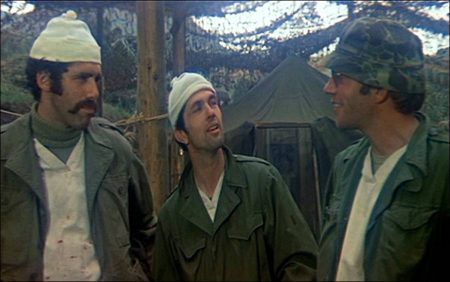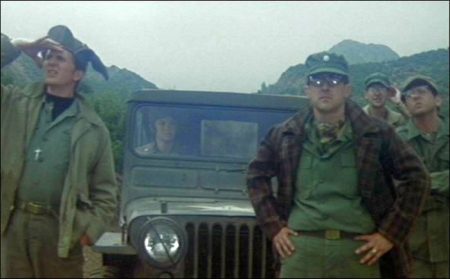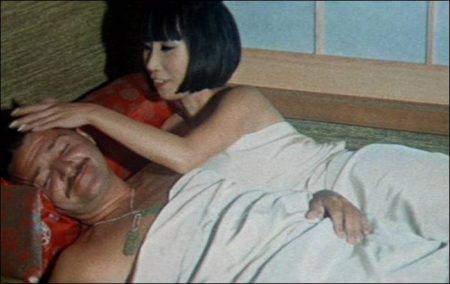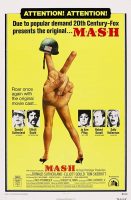Taglines: You’re not a real M*A*S*H fan until you’ve seen the original.
M*A*S*H movie storyline. The personnel at the 4077 MASH unit deal with the horrors of the Korean War and the stresses faced in surgery by whatever means. The tone at the MASH is established by recent arrivals, surgeons Captains ‘Hawkeye’ Pierce, ‘Duke’ Forrest, and ‘Trapper’ John McIntyre – the latter who Hawkeye knows he’s met somewhere, but Trapper who won’t divulge where – whose antics can be best described as non-regulation, and in the negative words of one of their fellow MASH-ers: unmilitary.
The unit’s commanding officer, Colonel Henry Blake, doesn’t care about this behavior as long as it doesn’t affect him, and as long as they do their job and do it well, which they do. Their behavior does extremely bother fellow surgeon, Major Frank Burns, and recently arrived head nurse, Major Margaret Houlihan, who obtains the nickname ‘Hot Lips’ based on information they glean about her through underhanded means.
Beyond their battles with Frank and Hot Lips, Hawkeye, Duke and/or Trapper help unit dentist Painless with a personal crisis, try to figure out if Hot Lips is a true blond, travel to Japan for a work and what they hope is a recreational trip, and hope to win big on a football bet against another unit in which they on the surface are the underdogs.
M*A*S*H is a 1970 American black comedy war film directed by Robert Altman and written by Ring Lardner Jr., based on Richard Hooker’s 1968 novel MASH: A Novel About Three Army Doctors. The picture is the only theatrically released feature film in the M*A*S*H franchise, and it became one of the biggest films of the early 1970s for 20th Century Fox.
The film depicts a unit of medical personnel stationed at a Mobile Army Surgical Hospital (MASH) during the Korean War. It stars Donald Sutherland, Tom Skerritt, and Elliott Gould, with Sally Kellerman, Robert Duvall, René Auberjonois, Gary Burghoff, Roger Bowen, Michael Murphy, and in his film debut, professional football player Fred Williamson.
Although the Korean War is the film’s storyline setting, the subtext is the Vietnam War — a current event at the time the film was made. Doonesbury creator Garry Trudeau, who saw the film in college, said M*A*S*H was “perfect for the times, the cacophony of American culture was brilliantly reproduced onscreen.”
The film won Grand Prix du Festival International du Film, later named Palme d’Or, at 1970 Cannes Film Festival. The film went on to receive five Academy Award nominations, including Best Picture, and won for Best Adapted Screenplay. M*A*S*H was deemed “culturally significant” by the Library of Congress and was selected for preservation in the United States National Film Registry. The Academy Film Archive preserved M*A*S*H in 2000. The film inspired the television series M*A*S*H, which ran from 1972 to 1983. Gary Burghoff, who played Radar O’Reilly, was the only actor playing a major character who was retained for the series.
Filming and production
Robert Altman, relatively new to the filmmaking establishment at that time, lacked the credentials to justify his unorthodox filmmaking process and had a history of turning down work rather than creating a poor-quality product. Altman: “I had practice working for people who don’t care about quality, and I learned how to sneak it in.” “Twentieth Century Fox had two other wars going on, ‘Patton’ and ‘Tora! Tora! Tora!’” Altman remembered. “Those were big-budget pictures, and we were cheap. I knew that if I stayed under budget and didn’t cause too much trouble, we could sneak through.”
The filming process was difficult because of tensions between the director and his cast. During principal photography, Sutherland and Gould allegedly spent a third of their time trying to get Altman fired,[10] although this has been disputed. Altman later commented that if he had known about Gould and Sutherland’s protests, he would have resigned. Gould later sent a letter of apology, and Altman used him in a number of his later works — including The Long Goodbye, California Split, Nashville, and The Player — but Altman never worked with Sutherland again.
Because of the context of the film being made — during the height of America’s involvement in the Vietnam War — 20th Century Fox was concerned that audiences would not understand that it was ostensibly taking place during the Korean War. At the request of the studio, a caption that mentions the Korean setting was added to the beginning of the film, and PA announcements throughout the film served the same purpose.
Only a few loudspeaker announcements were used in the original cut. When Altman realized he needed more structure to his largely episodic film, editor Danford Greene suggested using more loudspeaker announcements to frame different episodes of the story. Greene took a second-unit crew and filmed additional shots of the speakers.
On the same night these scenes were shot, American astronauts landed on the moon. The Korean War is explicitly referenced in announcements on the camp public address system[10] and during a radio announcement that plays while Hawkeye and Trapper are putting in Col. Merrill’s office, which also cites the film as taking place in 1951.
M*A*S*H (1970)
Directed by: Robert Altman
Starring: Donald Sutherland, Elliott Gould, Tom Skerritt, Sally Kellerman, Robert Duvall, Roger Bowen, René Auberjonois, David Arkin, Jo Ann Pflug, Gary Burghoff, Fred Williamson
Screenplay by: Ring Lardner Jr.
Production Design by: Norman A. Cook
Cinematography by: Harold E. Stine
Film Editing by: Danford B. Greene
Set Decoration by: Stuart A. Reiss, Walter M. Scott
Art Direction by: Arthur Lonergan, Jack Martin Smith, Michael Friedman
Music by: Johnny Mandel
MPAA Rating: R for sexual content.
Distributed by: 20th Century Fox
Release Date: January 25, 1970 (United States)
Views: 373



